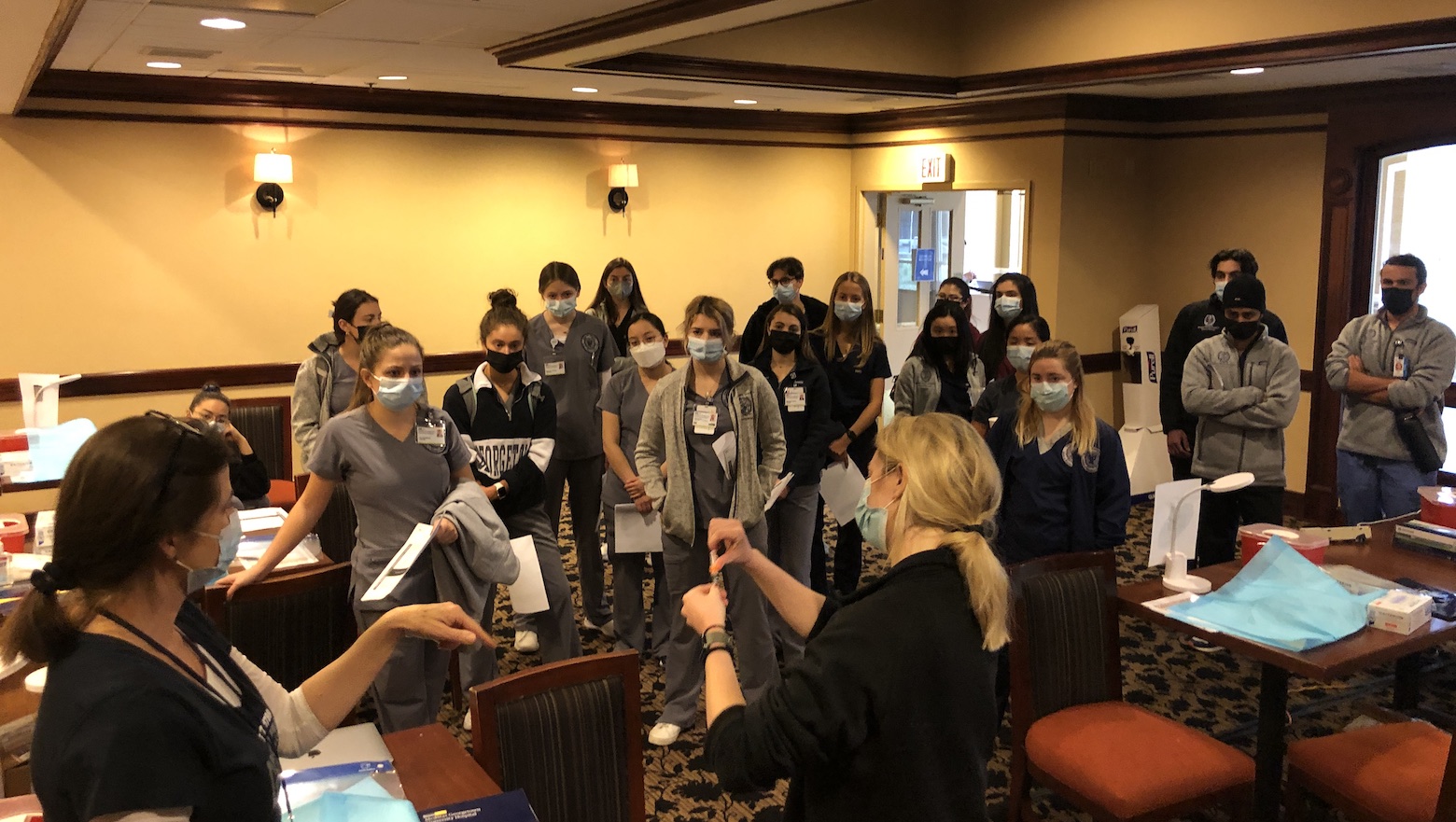COVID-19 Vaccine Booster Clinics Promote Public Health, Interprofessional Education
December 3, 2021 – Georgetown nursing and medical students are working together to administer COVID-19 vaccine booster shots for the campus community – an opportunity both to promote public health and to support interprofessional education. Two thousand individuals have signed up for the two clinics.

Dr. Ranit Mishori, who is the university’s chief public health officer, stressed the importance of getting boosters. Multiple studies have shown how the effectiveness of the Moderna and Pfizer/BioNTech COVID-19 vaccines lessens about a half-year after they were administered, while the Johnson & Johnson vaccine has diminished immunity at two months.
“It appears very likely that receiving only two shots of mRNA vaccines or one in the case of the J&J vaccine does not offer enough protection from infection, though the vaccines are very effective in preventing severe disease and death,” she said.
She added that boosters are essential at universities – a high-risk “congregate setting” – for protecting the health and safety of students, faculty, and staff.
‘Extremely Passionate’
“We are proud of the high vaccination rate we’ve had so far and hope to match those numbers with the rate of booster vaccination,” Mishori said.
Senior BSN student Kate Monogue-Rines (NHS’22) described how she values this opportunity to support the community’s health and well-being.

“As a nursing student, the pandemic has left me feeling helpless at times,” she said. “Having vaccine and booster clinics has helped me to take back some power by making sure that the community I am a part of is protected against this deadly disease.”
Third-year medical student Beth Glowacki (M’23) explained, “This is not the first mass vaccination clinic I have helped organize through Georgetown, and it will certainly not be the last.”
“It has been amazing to see how much effort goes into the planning of our clinics, and everyone involved is extremely passionate about the health of our community,” she said. “We are excited to play a part in combating this virus in our community and continuing to promote the health and wellness of our community members.”
(Learn about medical and nursing student participation this past spring at the DC government’s high-capacity vaccination sites. Also learn about nursing student participation at influenza vaccine clinics.)
Interprofessional Education
In addition to the important public health dimensions of the clinics, faculty and students discussed the opportunity for interprofessional education.
“It is our firm belief that in order to enhance interdisciplinary understanding in the workplace, interprofessional education is critical,” said Professor Susan Coleman, instructor of professional nursing practice at the School of Nursing & Health Studies.

“We’re fortunate to have nursing and medical programs at Georgetown,” added Coleman, a public health nurse who helped organize the clinics. “These COVID-19 booster clinics are the latest example of how this interprofessional collaboration can advance health and well-being.”
Mishori agreed, noting that “health care is about teamwork.”
“It is important to start having interprofessional experiences early on in the education process,” said Mishori, also a professor of family medicine at the School of Medicine. “A booster clinic is a perfect opportunity to have medical and nursing students working alongside each other and teaching one another while providing a crucial service to the university community.”
Value of Teamwork
Monogue-Rines and Glowocki agreed.
“I would say that events like these where we can have medical and nursing students work together give us a taste of how much this teamwork will be important in our future careers,” Glowocki said. “When training on how to give injections prior to the clinic, I already had some medical students come up to me and say how much they already learned from their nursing colleagues. This is an exciting opportunity for both cohorts of students to learn from each other.”

Monogue-Rines also took part in previous COVID vaccination efforts in the District of Columbia along with nursing and medical student peers.
“Participating in this clinic gives us the opportunity to practice working on an interdisciplinary team – something that we will have to do daily once we enter the workforce . . . ,” she said. “COVID-19 has impacted our community deeply, and vaccines and boosters are the best defense we have against the pandemic.”
Added Monogue-Rines: “It is incredible that we are bringing that to our community in a way that helps our nursing and medical students grow.”
Photos and story by Bill Cessato

